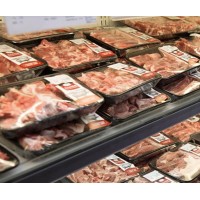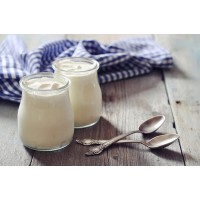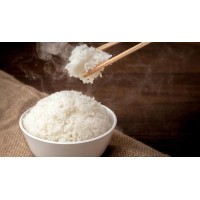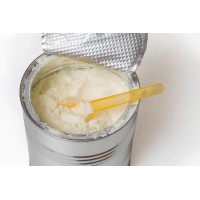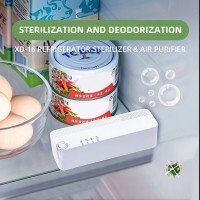How To Keep Eggs Fresh For A Long Time? Egg Preservation Skills
- 23.10.2024
- ling
- 0 reviews
Eggs are the food we all have and have high nutritional value, so some people will buy a lot of eggs at one time, but eggs are very easy to spoil, on the one hand, we must know how to preserve, and it is best not to buy too much. Let's talk about how to preserve eggs.
1. Egg preservation skills
Apply a layer of cooking oil to the surface of the eggs to prevent bacteria from entering and prolong the freshness time.
Spread some sawdust, rice, and chaff in the container, and place the eggs vertically with the small heads facing down to extend the freshness time.
Place 6 cm thick beans on the bottom of the container, arrange a layer of eggs, with the big end up, and spread another layer of beans to last for several months.
The most appropriate storage temperature for eggs is 5°C~7°C, and they can be stored in the refrigerator. In the refrigerator, eggs can be stored for up to two months.
2. Precautions for the preservation of eggs
Eggs after buying back are contraindicated for cleaning and preservation. Because there is a "protective film" on the outside of the eggshell, it can play a role in sealing the pores on the eggshell.
It is best to put the tip of the egg facing down, because the air chamber of the egg is located in the round end of the egg, and the round end is pointed upward, which can avoid yellowing and prolong the storage time.
Continue Reading
1. The importance of egg preservation
As a common ingredient in our daily life, the importance of egg preservation cannot be overlooked. Properly preserving eggs not only ensures that their nutrients are not lost, but also maintains a good taste and avoids waste due to spoilage.
Eggs are rich in protein, vitamins, minerals and other nutrients, and are one of the important sources of nutrients for the human body. If not stored properly, eggs are susceptible to bacterial contamination, which can be caused by foodborne pathogens such as Salmonella. Eating contaminated eggs may cause symptoms of food poisoning such as abdominal pain, diarrhea, fever, nausea or vomiting for a short period of time.
At the same time, the quality of eggs will gradually decrease with the increase of storage time. For example, if the egg has been stored for too long, the yolk and egg white will become thinner, the fluidity will be higher, and even the yellowing phenomenon will appear, which will seriously affect the taste. In addition, eggs stored in an inappropriate environment can also harbor bacteria such as E. coli and salmonella, which can threaten food safety.
In addition, proper storage of eggs also avoids waste. If eggs spoil because they are not stored properly, they have to be discarded, which not only causes waste of food, but also wastes our money.
In conclusion, proper egg preservation is essential to ensure that we can enjoy nutritious and good-tasting eggs. We should take the correct preservation method according to the characteristics and preservation requirements of eggs to prolong the shelf life of eggs and ensure their quality and safety.
Second, the temperature and duration of egg storage
(1) The shelf life at room temperature
Eggs can generally be stored for 10-15 days at room temperature, but the exact shelf life depends on environmental factors. For example, if the ambient temperature is high and the ventilation is poor, the storage time of eggs may be shortened. In general, the shelf life of eggs at room temperature will vary depending on the season. In summer, the temperature is high, and eggs can be stored for about 7-10 days at room temperature; The temperature in spring and autumn is more suitable, and eggs can be stored for 10-12 days at room temperature; In winter, the temperature is low, and eggs can be stored for 12 - 15 days at room temperature.
(2) Advantages under refrigerated conditions
Eggs can be stored at 2 - 5°C for a longer shelf life. In this temperature range, the quality of the protein and yolk is not affected, nor does it affect the nutritional content of the egg. In winter, when stored at room temperature, eggs should be eaten within 15 days, while refrigerated at 2 - 5°C, preferably within 40 days; In summer, when stored at room temperature, eggs should be eaten within 10 days, and if refrigerated, they can be kept much longer. For example, raw eggs can be stored in the refrigerator for about a month in summer, while in summer, at room temperature, they can only be stored for about a week due to the high weather temperature.
(3) The optimal storage temperature range
Eggs are best stored at 4°C - 12°C. If the eggs are kept within this temperature range, their shelf life can be extended and they will be able to maintain good quality. In this temperature range, the quality of the protein and yolk is not affected, nor does it affect the nutritional content of the egg. If the storage temperature of the egg is too high, it will accelerate the spoilage of the protein and yolk, affecting the taste and quality of the egg. If the storage temperature of eggs is too low, it will affect the taste and quality of eggs, and will also lead to the wilting of eggs and the loss of nutrients, thus affecting human health.
3. Methods and skills of egg preservation
(1) Refrigerator preservation points
Do not wash before storage to avoid damaging the protective film, and wipe off the dirt with a semi-wet rag.
After buying the eggs, do not rush to wash the eggs with water, because there is a natural protective film on the surface of the eggs, which can prevent bacteria from invading the inside of the eggs, and also reduce the evaporation of water inside the eggs. If the surface of the egg is dirty, you can gently wipe it clean with a semi-damp rag. If you wash the eggs with water, it will destroy this protective film, making it easier for bacteria to invade the inside of the eggs, which can lead to spoilage of the eggs.
Place the egg yolk with the big head up and the small head down so that the yolk floats under the air chamber to prolong the freshness time and store it separately from the meat.
When storing eggs in the refrigerator, they should be placed with their heads facing up and their heads facing down. This is because the large head of the egg has an air chamber, so that the egg yolk can float up and stick to the air chamber, which can not only prevent microorganisms from invading the egg yolk, but also help to ensure the quality of the egg. At the same time, eggs should not be stored with meat, as meat may carry bacteria and easily contaminate eggs.
Consume as soon as possible after taking it out of the refrigerator and should not put it back again to prevent bacteria from entering.
Fresh eggs taken out of the refrigerator should be eaten as soon as possible and should not be left for a long time or refrigerated. Because eggs "sweat" at room temperature after being removed, bacteria and microorganisms in small droplets of water can quickly penetrate deep into the inner layer of the egg liquid through the eggshell, so the eggs can no longer have a shelf life and should be eaten immediately.
(2) Tips for room temperature preservation
Refrigerate in a dry and cool place at ambient temperatures above 15 degrees.
Eggs can be stored in a dry and cool place, and it is best to keep them refrigerated if the ambient temperature is higher than 15 degrees. When keeping eggs at room temperature, avoid direct sunlight and humid environments so as not to affect the quality of the eggs.
A layer of cooking oil can be applied to prevent bacteria from entering and water evaporation, and is only suitable for a specific temperature range.
Applying a thin layer of cooking oil to the surface of the eggs can prevent the evaporation of carbon dioxide and water in the eggshell, and can also prevent bacteria from leaching, and can be stored for about 36 days in summer. However, this method is only suitable for temperatures between 25 and 30 degrees Celsius.
It is stored in rice with the small head down and the big head up, and the rice is dried to prevent bacteria from entering.
Eggs can be stored in rice, which is able to keep out the air, and the surface of the rice is dry and has a good moisture-proof effect. When storing, pay attention to the eggs, do not put the eggs horizontally, the small head down, the big head up to place the eggs, the eggs preserved in this way can be stored for two to three months, will not spoil.
(3) Other matters needing attention
Do not place eggs with food ingredients with strong odors to prevent accelerated deterioration of flavors.
Do not store eggs with food ingredients with strong odors, such as green onions, ginger, garlic, etc. The strong smell of such substances as onions, ginger, chili peppers, etc., can seep into the eggs through the pores on the eggshell, accelerating the deterioration of the eggs.
Be cautious when choosing eggs, and choose eggs with no cracks on the surface, regular shape, similar size, and no peculiar smell and color.
When buying eggs, it is necessary to choose eggs with no cracks on the surface, regular shape, similar size, and no peculiar smell and color. Cracked eggs are susceptible to bacterial contamination and deteriorate quickly. Eggs of regular shape and similar size are usually of better quality. Eggs with no peculiar smell and different colors indicate that they are not contaminated and are relatively fresh.
4. The misunderstanding and correct cognition of egg preservation
(1) Misunderstanding of cleaning eggs with water
Many people think that the shell of eggs is dirty and will be washed with water before storing it, which is the wrong approach. There is a layer of hoarfrost on the outside of the egg shell, which plays the role of sealing the stomata on the egg shell, which can not only prevent bacteria from entering the egg, but also prevent the evaporation of water in the egg, and keep the egg liquid fresh and tender. When the eggs are rinsed with water, the hoarfrost will fall off, the bacteria will easily invade, and the water will also evaporate easily, making the eggs more likely to spoil. Eggs that need to be preserved should not be rinsed with water, but cooked after washing the shells when they are ready to be eaten.
(2) The misunderstanding of placing eggs horizontally
Placing eggs horizontally is also the wrong way to store them. The egg whites of fresh eggs are thick and effectively hold the yolk in place in the center of the egg white. After being stored for a long time, especially when the outside temperature is high, the protein mucus will slowly shed some of its water under the action of protease and lose its role in fixing the egg yolk. At this time, if the egg is placed horizontally, because the specific gravity of the yolk is smaller than that of the white, the yolk will float up, close to the eggshell, and become a sticky egg. Therefore, eggs should not be stored horizontally, and the correct way is to put them vertically, with the big head facing up.
(3) The importance of correct storage methods to the quality of eggs
Proper storage of eggs ensures the quality and safety of the eggs. If not stored properly, eggs are susceptible to bacterial contamination and spoil faster, which will not only affect the taste, but may also cause harm to human health. For example, eating spoiled eggs may cause food poisoning, with symptoms such as abdominal pain, diarrhea, fever, nausea, or vomiting. Therefore, we should correct the wrong practices such as washing eggs with water and placing eggs horizontally, and adopt correct preservation methods, such as putting the big head up and small head down in the refrigerator, or storing it in a dry and cool place, applying a layer of cooking oil or putting it in rice, and avoiding placing it with food materials with a strong smell, etc., so as to extend the shelf life of eggs and ensure the quality of eggs.
Reviews (0)
Related Articles
Celery Preservation Secrets: Keeping Freshness for a Long Time
- 18.10.2024
- ling
- 0 reviews
To keep freshness and maintain celery's nutrition and taste, methods:refrigerated storage,cryopreservation,discharge basin,fake plant storage,storing celery in plastic bags by vacuum sealing machine
Read MoreHow To Store Meat? Various Types Of Meat Preservation Methods
- 20.10.2024
- ling
- 0 reviews
Meat Preservation methods: soy sauce soaking, mustard sealing, pressure cooker processing, honey hanging and drying, lard, aluminum foil or plastic bags in the refrigerator freezer, spraying glucose solution,etc.
Read MoreHow To Preserve Low-temperature Yogurt?
- 20.10.2024
- ling
- 0 reviews
Low-temperature yogurt really needs to be kept fresh. Once it goes bad, it can cause unhealthy phenomena for consumers. Now let's introduce how to store low-temperature yogurt.
Read More10 Honey Storage Tips: Keeping Your Honey Sweet and Fresh
- 23.10.2024
- ling
- 0 reviews
To store honey correctly to prevent spoilage and maintain its quality, you could follow tips:sealed storage by proper lid sealing,cool and ventilated storage avoiding light and sunlight,container material considerations avoiding metal containers,refrigerator storage
Read MoreHow To Preserve Cooked Rice?
- 25.10.2024
- ling
- 0 reviews
Cooked rice is easy to spoil (fluff,moist,rancid,moldy,yellow,stiffen) if not stored properly,rice preservation tips:refrigerator refrigeration,thermal preservation,cryopreservation,vinegar,stir-fried preservation
Read MoreHow To Store Opened Milk Powder?
- 25.10.2024
- ling
- 0 reviews
Milk powder is very susceptible to agglomerates when wet, do not put openned milk powder in the refrigerator,it should be kept in a cool, dry place,seal the opened milk powder in a sealed bag.
Read MoreRelated Products
XD-16 Refrigerator Sterilizer & Air Purifier
Product Name:Refrigerator Air PurifierProduct Model:XD-16Charging Voltage:DC4.7V~5.2VPower:5WWorking..
$15.00
QHCD11 USB Rechargeable Food Vacuum Sealer
Rechargeable Portable Household Food Vacuum Sealer Built-in lithium battery One-key VacuumSeries:Rec..
$30.00
QHF10 Mini Rechargeable Vacuum Sealer Machine For Food Moistureproof And Storage
New household mini vacuum sealer machine, portable charging model sealing clip to keep food freshnes..
$9.80
Fruit and Vegetable Food Storage Container Metal Jar Set(3 Pieces with Planer Tool )
Product Name: Fruit and Vegetable Food Storage Container Jar Set (Potato Bucket, Onion Bucket, Ginge..
$15.00



